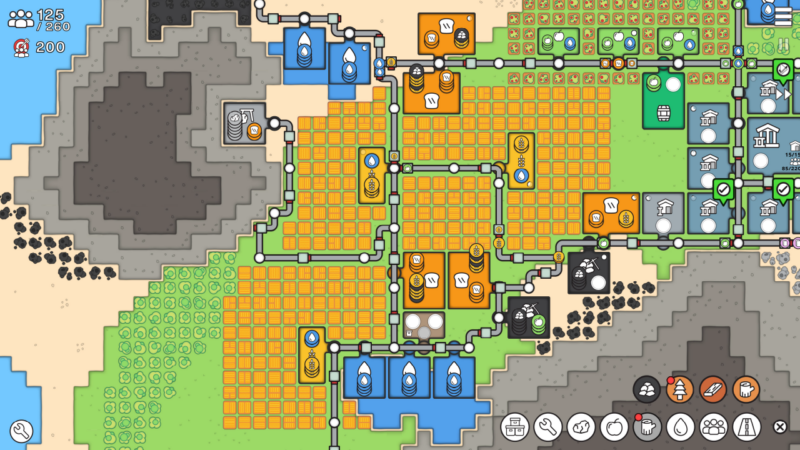
Goblinz Studio
You can’t buy Mini Settlers right now, but I think you should play the free “Prologue” demo and wishlist the full game if you dig it. It’s not quite like any other city builder I’ve played.
Mini Settlers is “mini” like minimalism. It is in the same genre, but quite far from, games like Cities: Skylines 2 (a choice with some proven merit). Your buildings are not 3D-rendered with real-time lighting. Your buildings are colored squares, sometimes with a few disc tokens stacked on them, tabletop-style. Your roads don’t have traffic, but they have drivers (tiny squares) that take resources between nodes. When things go wrong, you don’t get depressing news about pollution and riots; some people just leave their homes, but they’ll come back if you fix what’s wrong.
Mini Settlers announcement video.
Mini Settlers is not the game to play to satisfy your long-running suspicion that urban planning was your missed calling. In the (non-progress-saving) Prologue-free demo out this week, the mines and quarries have infinite resources. There is no “money” to speak of, so far as I can tell. Apple farms must be placed near apple orchards and water pumps by water, and the rest is up to you. The interface looks like a thought experiment in how far you can get from traditional city sim HUDs, but then someone implemented it.
-
A larger-scale view of a developed settlement, one with much better road planning than I achieved.
Goblinz Studio -
The game layers information about resources and needs, such that it never feels overwhelming.
Goblinz Studio -
Natural resources and land formations require you to work around them in creative ways.
Goblinz Studio -
Each circle is a node, and each square is a worker, shuttling resources from node to node, as best they can.
Goblinz Studio
The biggest challenge I faced in my couple of sessions was textbook logistics, at least from a suburban or small-town perspective. Having developed SimCity Brain throughout prior decades, I tried to keep my residential areas (City Center and the Homes you build around it) away from anything resembling production, like rock quarries and lumber yards. Instead of bolstering housing values or improving aesthetics, which do not exist, this gave me a huge set of supply bottlenecks to try and work through.
Houses wanted regular supplies of apples and water, but spacing out everything made a ton of extra transit work. Every road is a maximum of seven tiles, and each one gets a worker that moves back and forth between waypoints, dropping off goods to buildings or leaving them for the next worker on the goods’ route. I had wanted to create a simple town of people building wood houses and eating apples, and instead, I had a micro-scale Wayfair job interview scenario, complete with tiny warehouses and delivery times.
But, here again, Mini Settlers is different, even when you’re flailing. You simply remove the roads and buildings that don’t work and put them in better places. The buildings take a bit to build again, but there’s no real game timer unless you want to enable one for personal bests. You can even enable a background mode so that the calm simulation keeps running while you absolutely do your best work on a Friday afternoon.
The “Prologue” is not verified for Steam Deck, but the developers have an official layout for it. I think it will do in a pinch, but there’s a lot of thumb-taxing trackpad pointing remaining in a game that seems grid-based enough to do with more gamepad controls. As for performance, it runs great. At 30 frames per second, my Deck guessed it could keep going for nearly five more hours.
Mini Settlers is due out in 2024, seemingly for PC only on Steam, for the moment. The minimum requirements are a Core i3, 4GB memory, and Intel HD Graphics 4000, but “Integrated cards also work.” As the developers at Knight Owl Games note, wishlisting the game helps it circulate inside Steam’s recommendation algorithm, even if you don’t ultimately play beyond the demo. I am going to note a second time here that the demo does not save your game when you exit, which is not another design choice to keep you calm but just a demo thing.
Between this and Against the Storm, I am enjoying the recent broadening of the “city builder” genre. It’s happening, weirdly enough, by going much smaller.
Listing image by Goblinz Studio




















+ There are no comments
Add yours